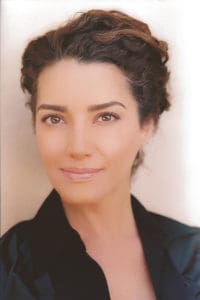The Process of Self-Discovery. Member Spotlight: Salomeh Diaz
Working in leadership development, Salomeh Diaz helps facilitate mediation in the corporate, government, healthcare, education, and non-profit sectors, and helps professionals develop the skills and processes required to foster safe environments in their workplaces. She is also a trained and certified somatic movement educator and therapist, mindfulness-centered somatic self-discovery certified practitioner, and is passionate about self-exploration and its positive effects on relating with others. Ultimately, Salomeh tries to create safe spaces for discussion where people feel they can trust and relate to her as a guide.
Corporate Life and Mediation

Salomeh Diaz has been subject to generational influenced that have pulled her towards mediation. Her grandmother worked in law and mediation and attracted community members and family when conflict needed to be resolved. Her grandmother was a very important person in her life, and Salomeh was very influenced by witnessing her effect on others. Salomeh began her professional career in the corporate space over 28 years ago, but lost her passion for that kind of work, around thirteen years into it. She re-evaluated her priorities and began asking herself larger questions about the impact her work was having. She realized that her interests lay in human behavior, potential, and impact on ourselves, each other, and our planet, and this realization brought her to the leadership development space. In this work, Salomeh brings groups together for process work, teaches business and professional development skills, carries out one-on-one executive coaching, is a keynote speaker at conferences and events, and facilitates conflict resolution and discussions. she is a community leader and facilitator in climate and social justice spaces among other responsibilities.
Salomeh is also a somatic movement educator and therapist, as well as a continuum movement teacher; she began somatic exploration about twenty-five years ago and continues to be inspired by the body’s inner workings while relating with others. This, she says, has allowed her to be very comfortable with the unknown and allowing for deepening group process work with compassion and courage. She calls this her “sweet spot,” and it contributes to her mediation work and her personal life in a number of ways. Ultimately, Salomeh calls herself a “bridge-builder, a conduit. I speak the language of social and climate justice, personal development, and corporate and business. And I’m a multicultural person myself. My own personal stories allow me to be able to translate and be a bridge across all these areas.” She got involved with MBBI at the recommendation of a mentor of hers, who thought that the organization’s mission-aligned well with Salomeh’s interests, and would allow her to explore her passions further.
Psychological Safety
Salomeh’s goal in facilitating discussions is to ensure the psychological safety of her clients. She feels that creating a safe environment allows for healing, which will benefit everyone in the room. This is necessary even, maybe especially, when certain parties are not enthusiastic about engaging in the discussion. Salomeh thinks it is important to find the heart of the conflict and build the trust necessary to foster an effective exchange. Conflict resolution often involves asking difficult questions, but Salomeh makes sure she does so using compassion and empathy to maintain the psychological safety of those around her. She thinks “it’s beautiful when people feel safe psychologically to express themselves, and being with what is emerging and creating space in a group setting. It is a blessing to witness what happens to others in the room once a person or group of people in the same group process insights and explorations.”
The Self in Conflict
Salomeh’s work in the body awareness, presence, and somatic space has been eye-opening for her, as it requires a deep dive into one’s inner self. She explains that witnessing someone’s process or being witnessed in your own process of self-discovery is a profound experience that can pertain to things like attachment and trauma. It is possible to connect with the experiences of others and derive healing from that. Salomeh thinks that “witnessing and being witnessed, the unfolding, the emerging, and how that influences everybody. That is healing.” This also pertains to her work in mediation, where she tries to maintain a safe group atmosphere while also connecting with people personally on an emotional level. Salomeh feels that self-discovery is the key to relating effectively to others, as it helps one recognize, acknowledge, and manage negative feelings that can come up while engaging in mediation. “As long as that awareness is there,” Salomeh says, “then once we make ‘missed-takes’ you don’t see yourself as a failure, you don’t question your worth and self-esteem.” Being able to deal well with negative feelings makes it less likely that these feelings will be taken out on others, thereby hindering the constructive nature of the discussion. Understanding yourself and the power, messages, and purposes of your feelings helps to foster resilience and the ability to sit in disagreement until an outcome is reached, potentially even one that might not have been thought possible.
Article by Tess Hargarten, MBBI Writer
